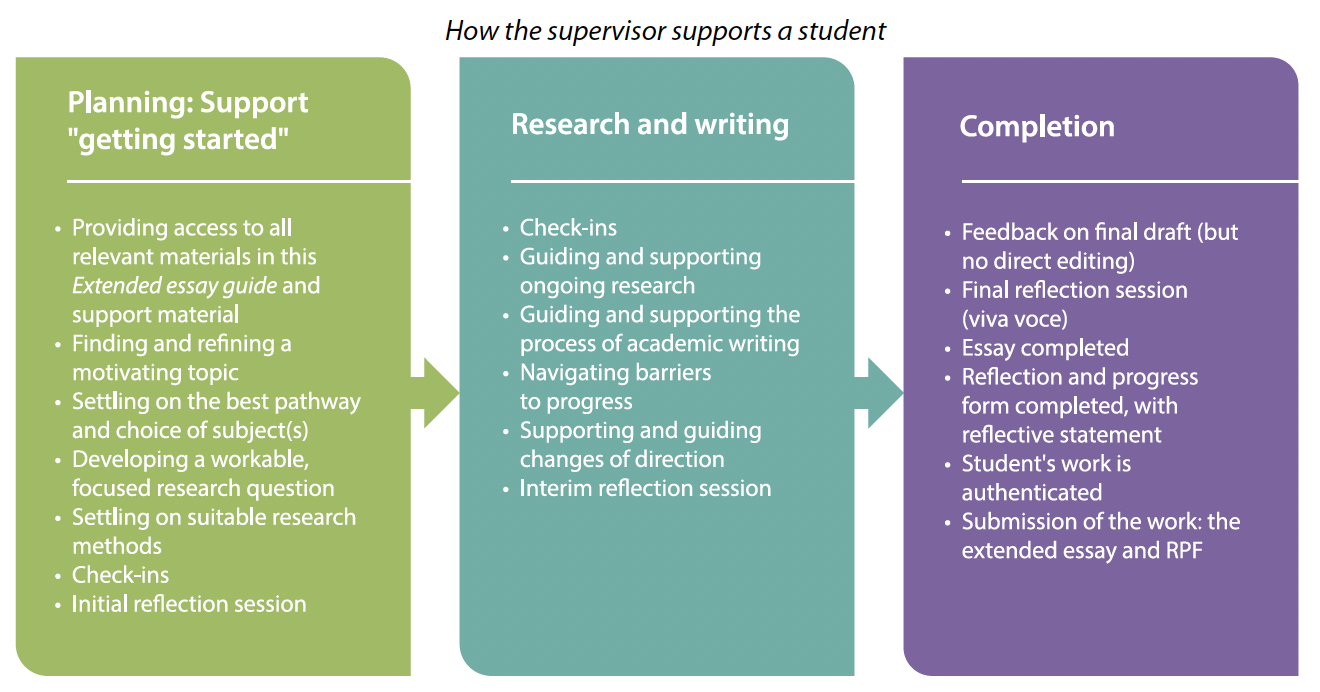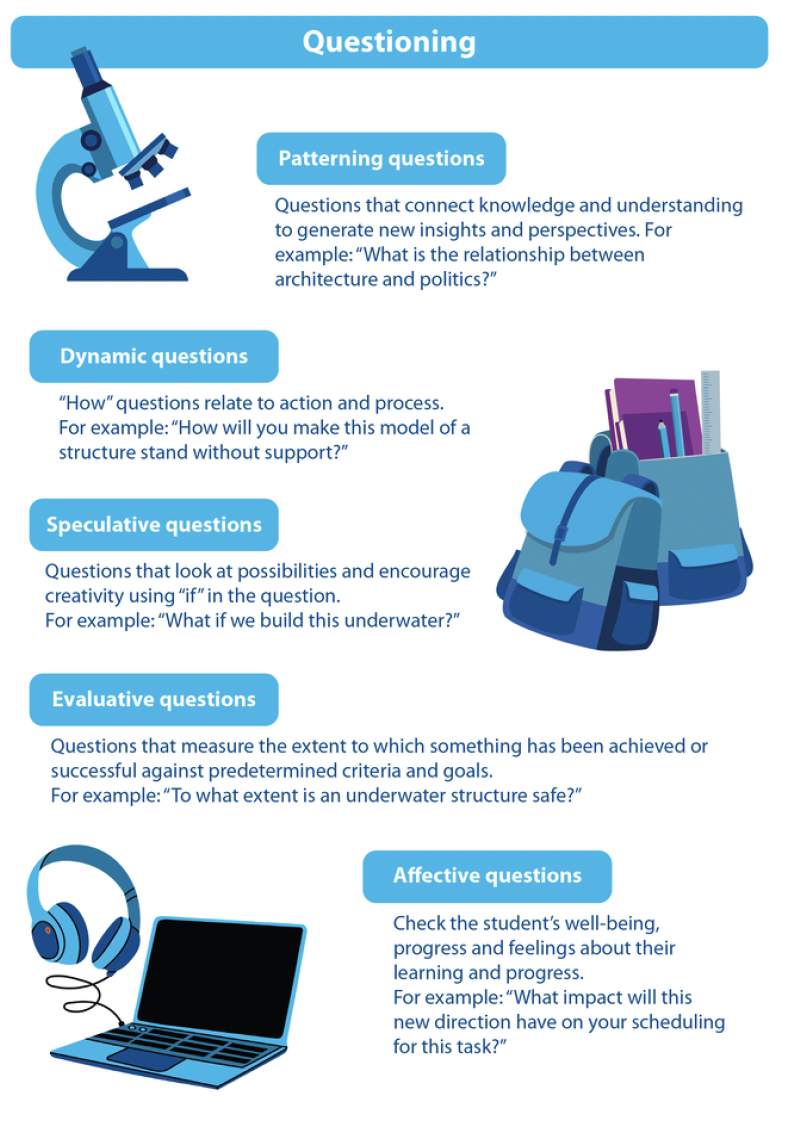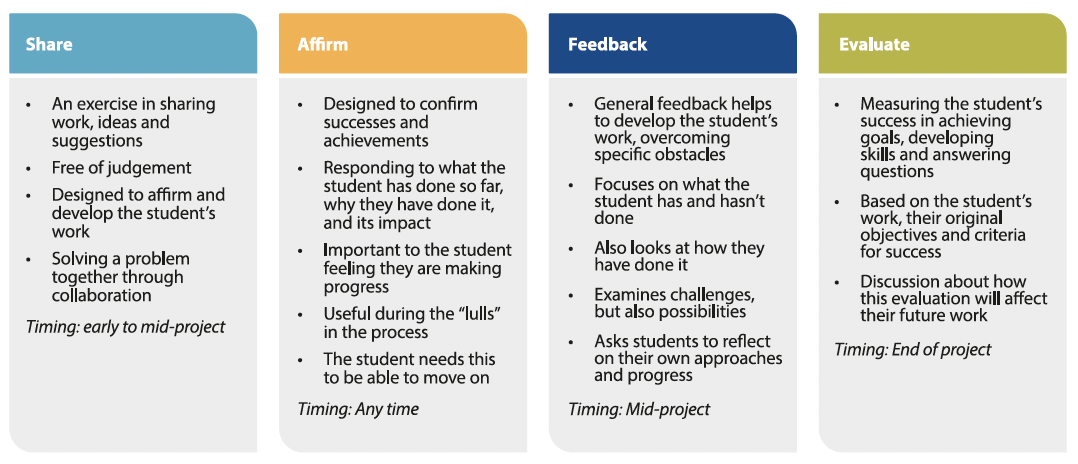


Supervisors are required to:
In addition, it is strongly recommended that supervisors:
EE Guide pg 104-105
QUESTIONS TO GUIDE REFLECTION SESSIONS
1st Session in MARCH
Focus:
Possible Guiding Questions:
EE Support Materials pg 14-19
QUESTIONS TO GUIDE REFLECTION SESSIONS
2nd Session in MAY
Focus:
Possible Guiding Questions:
QUESTIONS TO GUIDE REFLECTION SESSIONS
3rd Session in October (Viva Voce)
The viva voce is conducted once the student has submitted the final version of their extended essay. At this point in the process, no further changes can be made to the essay. The viva voce is a celebration of the completion of the essay and a reflection on what the student has learned from the process.
The viva voce should last 20–30 minutes. This is included in the recommended amount of time a supervisor should spend with the student.
Begin and end positively. This is the end of a long, sometimes tough, process.
Focus:
Possible Guiding Questions:
Also, use this reflection session as a way to check on the authenticity of the student's work
The supervisor can help the student reflect by careful questioning across three different categories.
Questions that help prompt student reflection can be divided into five categories,

The SAFE approach requires the supervisor and the student to decide together what type of response is most appropriate at any given time. Negotiating what type of response would be most useful can be very helpful, with some provisos.

Authenticating student work
All extended essays submitted to the IB for assessment must be authenticated by the student and supervisor and must not include any known instances of suspected or confirmed academic misconduct. All students and supervisors must verify the authenticity of the work to be uploaded to the eCoursework system. Once the authenticity of the student’s work has been determined, it is ready to be uploaded to the eCoursework system for assessment. At this point, the supervisor must not allow any retraction of the essay by the student for modification purposes unless there has been an administrative oversight.
The completed RPF is initialled and dated by the supervisor. It can then be uploaded to the IB eCoursework system along with the essay. The upload process represents the authentication of the student’s work.
It is extremely important that supervisors can confirm that they have followed the guidance for monitoring the student’s work throughout the process and can, to the best of their knowledge, confirm the authenticity of the work at submission (please refer to the Diploma Programme Assessment procedures).
If the supervisor is unable to confirm the authenticity of the work, this must be brought to the attention of the DP coordinator, who in turn should refer to the Diploma Programme Assessment procedures for guidance. No piece of student work should be uploaded or submitted to the eCoursework system if its authenticity is in doubt. It should be fully understood and noted that work submitted but not complying with the expectations and requirements outlined in this guide will be treated as a case of academic misconduct.
At any stage during the extended essay process, if authenticity is in doubt, the supervisor’s first step should be to discuss this with the student. Additionally, one or more of the following actions may be beneficial.
It is the responsibility of supervisors to ensure that students understand the meaning of academic integrity, especially the concepts of authenticity and intellectual property. Supervisors must ensure that students understand that the extended essay must be entirely their own work. It should also be made clear that the same piece of work cannot be submitted to meet the requirements of both the extended essay and another DP assessment component.
EE Guide pg 106
Under the Assessment tab in Toddle choose the appropriate number for each criterion (descriptors are included). The total points will be shown in the box on the bottom of the page. DO NOT FILL OUT THE COMMENT BOX ON THE ASSESSMENT TAB.
With the new EE Curriculum, there are no existing grade boundaries in place. You are encouraged to fill out the rubric on Toddle, but you must also give a holistic grade for each student.
For more details about assessment, look at the 'Assessment' tab above.
Five Criteria:
Total: 30 points
Holistic grade descriptors for the extended essay
Grade A
• The student demonstrates effective research skills, resulting in a well-focused and appropriate research question that can be explored within the scope of the chosen topic.
• There is effective engagement with relevant research areas, methods and sources.
• There is excellent knowledge and understanding of the topic in the wider context of the relevant discipline.
• There is effective application of source material and correct use of subject-specific terminology and/or concepts that further supports this.
• Conclusions are consistent, relevant and proficiently analysed.
• Arguments show sustained reason and are supported effectively by evidence.
• Research is critically evaluated.
• Coherence, consistency and effective use of structural conventions support readability to an excellent degree.
• Reflection on the extended essay learning experience is consistently evaluative and includes specific examples.
• Reflection shows consistent evidence of the student’s growth and transfer of learning.
Grade B
• The student demonstrates appropriate research skills, resulting in a research question that can be explored within the scope of the chosen topic.
• There is reasonably effective engagement with relevant research areas, methods and sources.
• There is good knowledge and understanding of the topic in the wider context of the relevant discipline.
• There is a reasonably effective application of source material and reasonable use of subject-specific terminology and/or concepts.
• Conclusions are consistent and accurately analysed.
• Arguments show reason and are often supported by evidence.
• Research at times shows critical evaluation.
• Coherence, consistency and use of structural conventions support readability to a good degree.
• Reflection on the extended essay learning experience is partially evaluative and includes specific examples.
• Reflection often shows evidence of the student’s growth and transfer of learning.
Grade C
• The student demonstrates evidence of research undertaken, leading to a research question that is not necessarily expressed in a way that can be explored within the scope of the chosen topic.
• There is partially effective engagement with mostly appropriate research areas, methods and sources. However, there are some discrepancies in those processes, although these do not interfere with the planning and approach.
• There is some knowledge and understanding of the topic in the wider context of the discipline, and the knowledge is mostly relevant.
• There is an attempted application of source material and appropriate terminology and/or concepts; an attempted synthesis of research results with partially relevant analysis.
• Conclusions are partly supported by the evidence.
• Arguments are descriptive rather than analytical.
• There is a partially successful evaluation of the research.
• The essay is not always coherent and consistent, and structural conventions are irregularly applied, but this does not significantly hinder readability.
• Reflection on the extended essay learning experience is descriptive and includes some specific examples.
• Reflection sometimes shows evidence of the student’s growth and transfer of learning.
Grade D
• The student demonstrates a lack of research, resulting in unsatisfactory focus and a research question that is not answerable within the scope of the chosen topic.
• At times, there is engagement with appropriate research, methods and sources, but discrepancies in those processes occasionally interfere with the planning and approach.
• There is some relevant knowledge and understanding of the topic in the wider context of the discipline but at times the knowledge is irrelevant.
• There is an attempted application of source material but with inaccuracies in the use of, or underuse of, terminology and/or concepts.
• There is irrelevant analysis and inconsistent conclusions as a result of a descriptive discussion.
• There is a lack of evaluation.
• The limited coherence and consistency of the essay and absence of structural conventions hinders readability.
• Reflection on the extended essay learning experience is descriptive.
• Reflection on the student’s growth is limited to a description of the process and there is no evidence of transfer of learning.
Grade E (a failing condition)
• The student demonstrates little or no research, a lack of focus and an ineffective research question.
• There is a generally unsystematic approach and a resulting unfocused research question.
• There is limited engagement with limited research and sources.
• There is generally limited and only partially accurate knowledge and understanding of the topic in the wider context of the discipline.
• There are ineffective connections in the application of source material, and inaccuracies in the terminology and/or concepts used.
• The results of research are summarized with inconsistent analysis.
• There is an attempted outline of an argument but one that is generally descriptive in nature.
• The lack of coherence and consistency and absence of structural conventions significantly hinders readability.
• Reflection on the extended essay learning experience is very limited, with no evidence of transfer of learning.
EE Guide pg 115-117
For EE supervisors: Here is the standard description for everyone to post (copy and paste) for EE in grade S2 G11 and D1 G12 reports:
The Extended Essay is an in-depth study of a focused topic resulting in a 4,000 word analytical essay. It promotes academic research and writing skills, providing students with an opportunity to engage in independent research on a topic of their choice under the guidance of their supervisor. By engaging with the theories, tools and techniques of their discipline, students gain valuable experience and further develop their ability to think critically.
Audience for the guide
The guide is now reframed as an inclusive document that aims to inform both educators and students. Some sections of the guide are written with the intention that students will be the primary readers, although supervisors and other extended essay stakeholders are also the intended audience for this material.
The aim of the student-focused approach of specific sections is to support the positive, personal engagement of students with their extended essay experience.
Extended essay pathways
Students choose between two pathways, depending on the nature of their chosen topic.
The subject-focused pathway continues as before. The interdisciplinary pathway is now more clearly defined and explained, broadened and enhanced, absorbing the legacy world studies extended essay.
Subject-specific guidance
In the guide, the new guidance is:
Reflection
The reflection aspect of the essay has also been adjusted.
Presentation of the content
In this new edition of the guide, user-friendliness and accessibility have been improved by reducing the length of the guide and making greater use of infographics and diagrams.
The ethical researcher
Ethical considerations from the legacy guide have been combined with new material to create a section on carrying out ethical research. The use of artificial intelligence (AI) has been addressed positively in this section, while taking care to alert students to the importance of producing their own authentic work and acknowledging the work of others in an appropriate way.
The assessment criteria
The legacy criteria have been amended and restructured, with a new maximum mark of 30.
Some of the main changes are as follows.
EE Support Materials pg 2-3
Read the EE Guide and Support Materials (available under the HOME tab above)
ASK EE bot can help answer questions about the EE process
What's New in the EE -Micro PD from the IBO (less than 30 minutes)
EE Supervisors' Handbook PPT (from Toddle)
WAB EE Supervisor slideshows by subject
Timeline-Class of 2027
Research Questions
You can use these if you find them helpful--*not required.
Under the "EE Subjects" tab above, there is a "Considering the Assessment Criteria" for each subject group. These might be helpful in your process.
A very important aspect of the latter stages of the extended essay process is the supervisor commenting on one completed draft of the essay. This is the last time the supervisor sees the essay before it is uploaded for submission. It is therefore vital that the level of support given is appropriate—too little support may negatively impact the capacity of the student to meet their potential; too much support pushes the boundaries of academic integrity and compromises the independence of the student’s work. The best way to manage this last stage is for the student to submit the draft essay prior to a supervision meeting, allowing time for the supervisor to add their written comments. Then, in the ensuing one-to-one discussion, the supervisor and the student go through the supervisor’s comments together. Any advice given by the supervisor should be expressed in terms of the way the work could be improved; the draft must not be heavily annotated or edited by the supervisor.
What supervisors can do
Comments can be added that indicate how the essay could be improved. The comments should be open-ended and not involve editing the text. Here are some examples.
Issue 1: The research question is expressed differently in three places—the title page, the introduction and the conclusion.
Comment 1: Is your research question consistent throughout the essay, including on the title page?
Issue 2: The essay rambles and the argument is not clear.
Comment 2: Your essay lacks clarity here. How could you make it clearer?
Issue 3: The student has made a mistake in their calculations.
Comment 3: Check this page carefully.
Issue 4: The student has left out a section of the essay.
Comment 4: There is something missing here. What is it? Check the essay against the requirements.
Issue 5: The essay presents something in the appendix that should be in the body of the essay.
Comment 5: Are you sure this belongs here?
Issue 6: The conclusion is weak.
Comment 6: What is it that you are trying to say here? Have you included all your relevant findings? Have you looked at unanswered questions?
Issue 7: The essay has an incomplete citation.
Comment 7: You need to check this page for accuracy of referencing.
What supervisors cannot do
Supervisors are not permitted to:
EE Support Materials pg 20